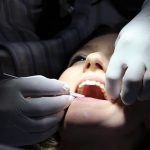While cracked, chipped or fractured teeth are probably most common with children due to their high level of physical activity, they can happen to anyone. Auto accidents, impacts to the face, sports injuries, falls and simply chewing can result in a tooth, or teeth, being damaged. Not only is this unattractive, it’s unhealthy.
Your dentist will determine a treatment plan based on the severity of the fracture. Treatment typically includes placing a dental crown on the cracked tooth. If the fracture effects the pulp chamber a root canal may also be necessary. If the tooth is split beyond repair, an extraction is likely necessary. In this situation tooth replacement is possible with implants or bridges.
Definition

A tooth fracture is a break or crack in the hard shell of the tooth. The outer shell of the tooth is called the enamel. It protects the softer inner pulp of the tooth that contains nerves and blood vessels. Depending on the type of fracture, the tooth may not cause any problems or it may cause pain.
Types of tooth fractures include:
- Craze lines—shallow cracks that cause no pain and require no treatment
- Fractured cusp—breaks in the chewing surface of the tooth
- Cracked tooth—the tooth cracks from the chewing surface down toward the root of the tooth
- Split tooth—cracks down through the root, separating a section of tooth
- Vertical root fracture—cracks begin in the root and move up toward chewing surface
What are the symptoms?

A cracked tooth will not necessarily cause any symptoms. People often have cracked teeth without even realizing it. Some types of cracks are harmless and do not require treatment.
However, if a person notices the following symptoms, they may have a more extensive type of crack that requires dental treatment:
- pain when eating, particularly when chewing or biting
- swollen gums around the cracked tooth
- teeth that have suddenly become sensitive to sweetness
- teeth that have suddenly become sensitive to hot or cold foods
- pain that tends to come and go
- discomfort around the teeth and gums that is hard to pinpoint
What might cause teeth to crack?

There are many different reasons why teeth can crack. Causes of a cracked tooth include:
- biting down too hard on a piece of food
- excessive grinding of the teeth
- physical injury
- a large existing filling, which can weaken the remaining tooth structure
A sudden temperature change can also crack a tooth. For example, this could happen if a person burns their mouth while drinking tea, then drinks a glass of cold water to soothe the pain.
How are cracked teeth diagnosed?
A cracked tooth is not always simple to diagnose. If the crack is not visible, a dentist will try to make a diagnosis by asking the person about their dental history and symptoms they are having. The dentist will then examine the teeth, possibly using a magnifying glass to help to identify cracks.
They may also use a pointed instrument called a dental explorer, which catches on any rough, cracked edges on the teeth’s surface.
A dental dye can also make cracks more visible. During the examination, the dentist will check the gums for signs of inflammation because cracks in teeth tend to irritate the gums. They may also ask the person to bite down on something, to try and pinpoint the source of the pain.
A dentist may take an X-ray of the teeth. X-rays do not always show where cracks have formed, but they can reveal problems in the pulp of the teeth. If the pulp of a tooth appears to be unhealthy, this can suggest a crack.
When should you see a dentist?

Anyone who suspects that they have a cracked tooth should make an appointment with a dentist as soon as possible. It is especially important to do so when there are pain and discomfort.
In the meantime, the following home remedies can relieve uncomfortable symptoms:
- rinsing the mouth with warm water, to keep it clean
- taking over-the-counter pain medications, such as ibuprofen
- using a cold compress against the cheek to help reduce swelling
The longer that a cracked tooth goes untreated, the more difficult it may be for a dentist to save the tooth. Complications may also occur, such as infection.Top of Form
Fractured tooth treatment

Dentists and endodontists determine the proper treatment for a fractured tooth depending on the extent and location of the crack. There are actually several different kinds of fractures in teeth, some of which require more intensive treatment than others, and your dental professional must diagnose your fracture before they proceed. In most cases where the tooth has not decayed or become infected, restoring the tooth and preventing further damage is an entirely feasible and routine procedure. Postponing treatment can lead to more serious complications such as an infection or a deeper fracture. That is why it is important not to ignore warning signs or dental pain and sensitivity. By seeking treatment early, there is a typically better prognosis for the tooth. which also usually results in a lower financial cost of treatment.
Chipped teeth
A surface-level chip in your tooth will rarely need treatment. These are considered minor fractures, and your dentist will more than likely use filling material only if there appears to be a risk of the chip getting worse. For aesthetic appearances, your dentist can file down and polish the tooth.
Craze lines
Craze lines are also surface-level fractures. In this case, they are minor cracks on the enamel that don’t reach below the surface. Your dentist may decide that treatment isn’t necessary, or they may polish the area to smooth out the surface.
Fractured cusp
Fractured cusps occur when a piece of the tooth’s chewing surface breaks off. They often occur around fillings, but are generally considered to be minor fractures. It is rare that a fractured cusp damages the pulp, and it usually does not cause pain. Dentists often place a new filling or crown over the area to protect the fracture from deepening.
Cracked tooth
A cracked tooth involves the entire tooth–a fracture that reaches from the enamel down to the nerve. While the tooth is not broken into pieces, the crack will gradually spread. It is at this stage when you may need to consult with a specialist for treatment. Sometimes, cracks can be repaired with filling material, but more often than not, a crown is necessary to prevent it from worsening. If the pulp becomes damaged, an endodontist may need to perform a root canal. A serious break exposes the nerve and will almost always cause pain or bleeding. In this case, a root canal is critical to remove the exposed nerve.
Split tooth
A split tooth often results from the prolonged spreading of a cracked tooth, and causes a completely vertical break that splits the tooth into two separate parts. An endodontist will likely perform a root canal and cover the root with a crown. Molars have more than one root, and when they split, it is sometimes possible to save one of the roots. The endodontist will remove the roots that cannot be saved and cover the remaining piece with a crown. When no roots can be saved, the tooth must be removed.
Vertical root fractures
These fractures begin in the root of the tooth and move upward toward the surface. They can often go unnoticed because they show minimal
symptoms until the surrounding bone and gum become infected. Extraction of the tooth is the most common treatment, but if the tooth can be saved by removing the fractured portion, endodontic surgery may be performed.
Even in cases when a fractured tooth must be removed, there are still options available to preserve your smile and overall oral health. Dental technology has advanced in leaps and bounds; innovations like dental implants allow dentists to anchor and reinforce prosthetic teeth that look and function like natural teeth. No matter how severe the fracture in your tooth, consulting your dentist as soon as possible and determining the appropriate treatment can effectively resolve the issue.
Prevention
To help reduce the chances of fractured teeth:
- Avoid chewing on hard objects such as ice, hard candy, popcorn kernels, or pens.
- Be aware of temperature extremes between foods and drinks..
- Wear a mouth guard for sports or recreational activities.
- Do not use your teeth to cut things or open plastic bags.
- Avoid clenching or grinding your teeth.
- Talk to your dentist if you grind your teeth at night.




